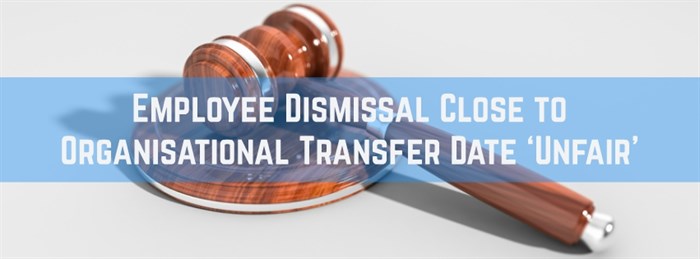Employee Dismissal 'Unfair'
|
|
|
| Recently debated in the case of ‘Hare Wines Ltd v Kaur and another’, the Court of Appeal has found in favour of the original findings of the tribunal hearing. Namely under TUPE regulations the employees dismissal from their employment (Mrs Kaur), was unfair. Mrs Kaur’s allegation was upheld that Hare Wines Ltd had not taken reasonable steps to resolve the working relationship between the two parties. Particularly this was in relation to the dismissal of the employee immediately before the transfer of ownership of the business in question; a wine wholesale organisation operated by ‘H&W Wholesale Ltd’ (H&W). In December 2014, the financial problems of H&W’ had come to a head, and it was decided that ‘Hare Wines’ would take over ownership of the business, and continue employing all of the previous staff at the organisation; all except Mrs Kaur. On the 9th December 2014, Hare Wines met with all employees, during this period Mrs Kaur was informed that her employment was being terminated immediately. The crux of the claim centred on the aforementioned meeting on the 9th December. Mrs Kaur stated in her claim that her dismissal was due to the transfer of ownership of the organisation. Whilst H&W contested this, stating that Mrs Kaur personally contested the transfer, as apparently she had a poor relationship with a member of staff in a more senior position. After considering both version of events, and considering supporting evidence; the tribunal leaned in favour of Mrs Kaur’ testimonial. Furthermore, the tribunal considered the argument over Mrs Kaur’ poor working relationship between the previously mentioned senior member of staff and herself. The tribunal came to the conclusion that H&W had made Mrs Kaur redundant as they believed she would have difficulties working with the senior member of staff. Additionally the tribunal maintained that the pertinent segment to Mrs Kaur’s case was if not for her dismissal, her employment would have continued after the transfer of ownership, like her other colleagues. Following this decision Hare Wines appealed to the Court of Appeal. The Court of Appeal upheld the original tribunal’s decision, reaffirming much of their previous decision. In conclusion as Mrs Kaur did not appeal to the actual transfer, the balance of probability leaned in favour of the fact that Mrs Kaur was made redundant based on perceived issues with senior member of staff, potentially leading to further clashes. As can be seen, the effects of TUPE are far reaching and complicated, and this case demonstrates quite clearly how it can determine the result of a case such as the one above. We stress that it is important to work with staff at all times to overcome obstacles to success, and solving long-term solutions professionally whilst following the correct channels. For more information on how PACT HR can work in tandem to help solve any HR issue in your organisation. We provide training, bespoke consultancy, and unlimited support. If you want to learn more, then visit us at our upcoming renowned Briefing Sessions this coming April 2nd – 4th. To register your interest and be one of the first to receive an invitation to our upcoming Briefing Sessions and more, speak with one of the team on 01274 436644, email us on Pact-HR@bradford.gov.uk , or reach out to us on Facebook or Twitter for more information on how PACT HR may help you. |
